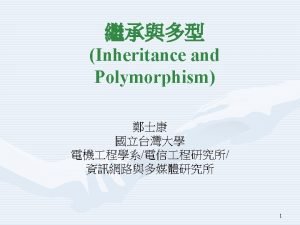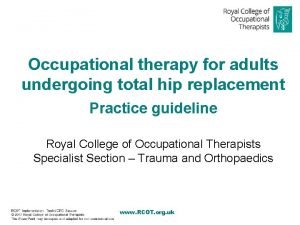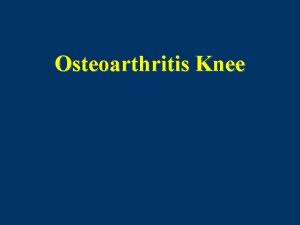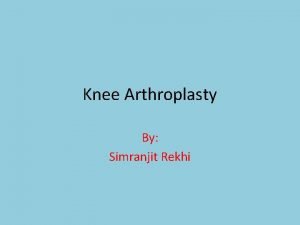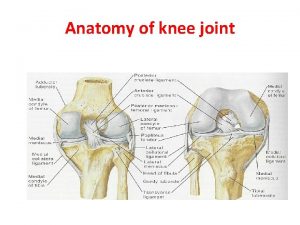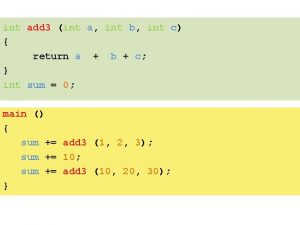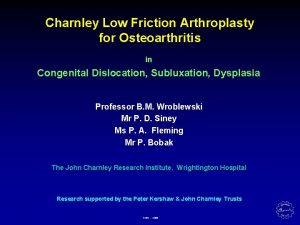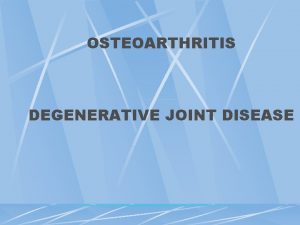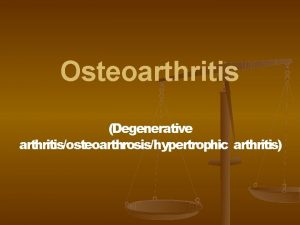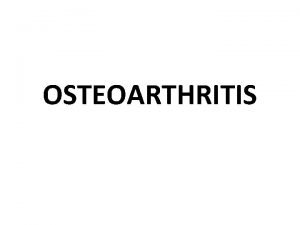knee arthroplasty in osteoarthritis Ghaem Int Hospital MEHRAN

















- Slides: 17

knee arthroplasty in osteoarthritis Ghaem. Int. Hospital MEHRAN SOLEYMANHA FELLO WS HIP) 19. Oct. 2017 ( ASS. PROF. GU MS , KNEE SUR GERY

History • The development of TKA began in the early 1970 s • about 20, 000 TKA procedures each year • second most common arthroplasty after total hip arthroplasty • The prosthesis choice varies depending on: • • • underlying disease severity of knee joint damage of the patient Skou T, et al. A Randomized, Controlled Trial of Total Knee Replacement. The New England Journal of Medicine. 2015


Indication • Painful severe osteoarthritis • Painful osteonecrosis with sub-chondral collapse of a condyle • Moderate painful osteoarthritis with progressive deformity Sébilo et al. Clinical and technical factors influencing outcomes of unicompartmental knee arthroplasty: Retrospective multicentre study of 944 knees. Orthopaedics & Traumatology: Surgery & Research. 2013

Absolute Contraindications • Recent Knee Sepsis • Extensor mechanism discontinuity or dysfunction • Painless, Well functioning Knee Arthrodesis Mills WJ , et al. The value of the ankle-brachial index for diagnosing arterial injury after knee dislocation: a prospective study. J Trauma. 2004

Relative contraindications • Medical conditions compromising patient’s ability to withstand anesthesia, metabolic demands of surgery and wound healing • Severe atherosclerotic disease of operative leg • Skin conditions such as psoriasis within operative field • Venous stasis disease with recurrent cellulitis • Morbid obesity • Osteomyelitis in proximity of knee • Recurvatum deformity secondary to muscle weakness Gademan MG, et al. Indication criteria for total hip or knee arthroplasty in osteoarthritis: a state-of-thescience overview. BMC Musculoskeletal Disorders 2016.

10 -20% very poor or no improvement following TKA § Inappropriate expectations § contralateral knee pain § higher psychological distress § high body mass index § advanced age § female gender § lower OA grade Raynauld, et al. Total Knee Replacement as a Knee Osteoarthritis Outcome: Predictors Derived from a 4 -Year Long-Term Observation following a Randomized Clinical Trial Using Chondroitin Sulfate. Cartilage. 2013.

UKA • minimally invasive approach • less blood loss • easier recovery of muscle damage De Jesus, et al. Evaluation of a Patient Decision Aid for Unicompartmental or Total Knee Arthroplasty for Medial Knee Osteoarthritis. J Arthroplasty. 2017

UKA Indications: knee osteoarthritis involving a single femoro-tibial compartment with a functioning anterior cruciate ligament (ACL) Contraindicated: • Knee ligamentous instability • Sever mal alignment • BMI > 30 • Inflammatory knee arthritis Palumbo et al. Diagnosis and Indications for Treatment of Unicompartmental Arthritis. Clin in Sport Med. 2014

Primary prosthesis

L. C. C. K prosthesis


hinged prosthesis Indications: • Extensor mechanism failure • Severe recurvatum instability

Prosthesis survival risk factors: • • anterior femoral notching osteoporosis rheumatoid arthritis steroid use female gender revision arthroplasty neurological disorders • In young patients, the higher demands result in a greater risk of wear Castagnini , et al. Total Knee Replacement in Young Patients: Survival and Causes of Revision in a Registry Population. The Journal of Arthroplasty. 2017

Causes of failure • infection • Sepsis • Component loosening • Instability / ligamentous laxity • Polyethylene wear with osteolysis • Periprosthetic fractures • Patellofemoral complications Lungu et al. Prediction of poor outcomes six months following total knee arthroplasty in patients awaiting surgery. . BMC Musculoskeletal Disorders 2014

better outcomes • Select patients carefully based on their: • age • Activities • knee function • degree of osteoarthritis • Improvements in polyethylene quality • greater implant position accuracy Sébilo et al. Clinical and technical factors influencing outcomes of unicompartmental knee arthroplasty: Retrospective multicentre study of 944 knees. Orthopaedics & Traumatology: Surgery & Research. 2013

Thank you
 Sum0
Sum0 Divideint
Divideint Int max(int x int y)
Int max(int x int y) Interface calculator public int add class test
Interface calculator public int add class test Public void drawsquare(int x, int y, int len)
Public void drawsquare(int x, int y, int len) Arthroplasty practitioner
Arthroplasty practitioner Occupational therapy intervention plan for hip arthroplasty
Occupational therapy intervention plan for hip arthroplasty Mehran najafi
Mehran najafi Mehran shakerinava
Mehran shakerinava Mehran convex mirror
Mehran convex mirror Mehran andalibi
Mehran andalibi Lesson 4 mirror mirror
Lesson 4 mirror mirror Mehran najafi
Mehran najafi Mehran najafi
Mehran najafi Mehran ahmadlou
Mehran ahmadlou Cappagh hospital pre assessment
Cappagh hospital pre assessment 7팩토리얼
7팩토리얼 Int f (int n)
Int f (int n)



